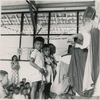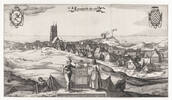Child Separation: (Post)Colonial Policies and Practices in the Netherlands and Belgium
DOI:
https://doi.org/10.18352/bmgn-lchr.10871Abstract
Children were central to Dutch and Belgian colonial projects. Children and youth were the objects of colonial interventions issued by missionaries and officials. However, children could also become actors who produced change in a colonial context. Crucial in colonial policies towards children was the separation of children from their parents, communities and/or culture (‘child separation’) in all kinds of forms – temporary or permanent, far from home or close by, in contact with their own community or cut off from it – and to various degrees of coercion (voluntary, from a situation of dependence, enforced with punishment or violence). Child separation projects could involve adoption, foster parenting, ‘apprenticeships’ serving a household, boarding schools or day schools. It could concern children from the local elite, but also children who ended up on the margins of their own communities or were even bought out of slavery. Child separation was never about education only, but always imposed specific morals and life styles on its subjects as well. It caused profound fault lines in colonised families and communities. For colonial politics, it was key to controlling, influencing and disciplining the colonised population (‘governmentality’). In the case of children of ethnically mixed descent, child separation often involved policing hierarchical racialised boundaries in the colony; in the case of indigenous children, it aimed at transforming the colonised population. Christian missions were pivotal in child separation projects. This special issue, therefore, pleads for a more central place of Catholic and Protestant missions in the analysis of Dutch colonial history, comparable to Belgian historiography. Finally, it is precisely these (missionary) colonial projects, often labeled as ‘soft’ or ‘civilising’, that have passed unnoticed into post-colonial discourses, organisations and practices, such as transnational adoption or surrogacy, and countless development projects in which children, detached from their own family and context, must be ‘saved’. Without proper scholarly attention for Christian missions in colonial history, these traces of the colonial past in the postcolonial present will not be recognised as such.Kinderen stonden centraal in Nederlandse en Belgische koloniale projecten. Kinderen en jongeren waren daarbij het object van koloniaal handelen van missionarissen, zendelingen en ambtenaren, maar zij konden ook zelf actoren worden die in een koloniale context veranderingen veroorzaakten. Cruciaal in deze koloniale projecten was het scheiden van kinderen van hun ouders, van hun gemeenschappen en van hun cultuur (child separation) in allerlei vormen – tijdelijk of voorgoed, ver van huis of dichtbij, in contact met de eigen gemeenschap of volledig daarvan afgesneden – en in diverse gradaties van dwang (vrijwillig, vanuit een situatie van afhankelijkheid, afgedwongen met straffen of geweld). Concreet kon het gaan om adoptie, pleegouderschap, het in huis nemen van werkende ‘leerjongens en -meisjes’, kostscholen of dagscholen. De kinderen zelf waren afkomstig uit de lokale elite, of het waren juist kinderen die in de marge van hun eigen gemeenschappen terecht waren gekomen, of zelfs door missionarissen uit slavernij werden gekocht. De doelstellingen van deze praktijken betroffen nooit alleen onderricht, maar altijd ook het aanleren van een bepaalde levenswijze en moraal. Niet alleen veroorzaakten de scheiding en heropvoeding ingrijpende breuklijnen in gekoloniseerde families en gemeenschappen; voor de koloniale politiek waren deze kinderen de sleutel tot het controleren, beïnvloeden en disciplineren van de gekoloniseerde bevolking (governmentality). In het geval van kinderen van etnisch gemengde komaf ging het vaak om het bewaken van de hiërarchische geracialiseerde grenzen in de kolonie; in het geval van lokale kinderen meer om het transformeren van de gekoloniseerde bevolking. Van veel instellingen voor opvoeding en onderwijs van deze kinderen vormden christelijke missie- en zendingsorganisaties de spil. In en met dit themanummer wordt daarom ook een lans gebroken voor de integratie van missie en zending in het analyseren van de Nederlandse koloniale geschiedenis, in navolging van de Belgische historiografie. Tot slot zijn het juist deze vaak als ‘zacht’ of ‘civiliserend’ aangemerkte koloniale projecten die ongemerkt zijn overgegaan in postkoloniale discoursen, organisaties en praktijken, zoals transnationale adoptie of draagmoederschap, en talloze ontwikkelingsprojecten waarin kinderen, losgezongen van hun eigen familie en context, ‘gered’ moeten worden. Zonder gedegen wetenschappelijke aandacht voor de rol van christelijke missie- en zendingsorganisaties in de koloniale geschiedenis zullen deze sporen van het koloniale verleden in het postkoloniale heden niet als dusdanig worden herkend.
Downloads

Published
How to Cite
Issue
Section
License
Copyright (c) 2021 BMGN - Low Countries Historical Review

This work is licensed under a Creative Commons Attribution-NonCommercial 4.0 International License.
Authors who publish with this journal agree to the following terms:
a) Authors retain copyright and grant the journal right of first publication with the work simultaneously licensed under a Creative Commons Attribution 4.0 International (CC BY 4.0) that allows others to share the work with an acknowledgement of the work's authorship and initial publication in this journal.
b) Authors are able to enter into separate, additional contractual arrangements for the non-exclusive distribution of the journal's published version of the work (e.g., post it to an institutional repository or publish it in a book), with an acknowledgement of its initial publication in this journal.
c) Authors are permitted to post their work online (e.g., in institutional repositories or on their website) prior to and during the submission process.
Authors are explicitly encouraged to deposit their published article in their institutional repository.










